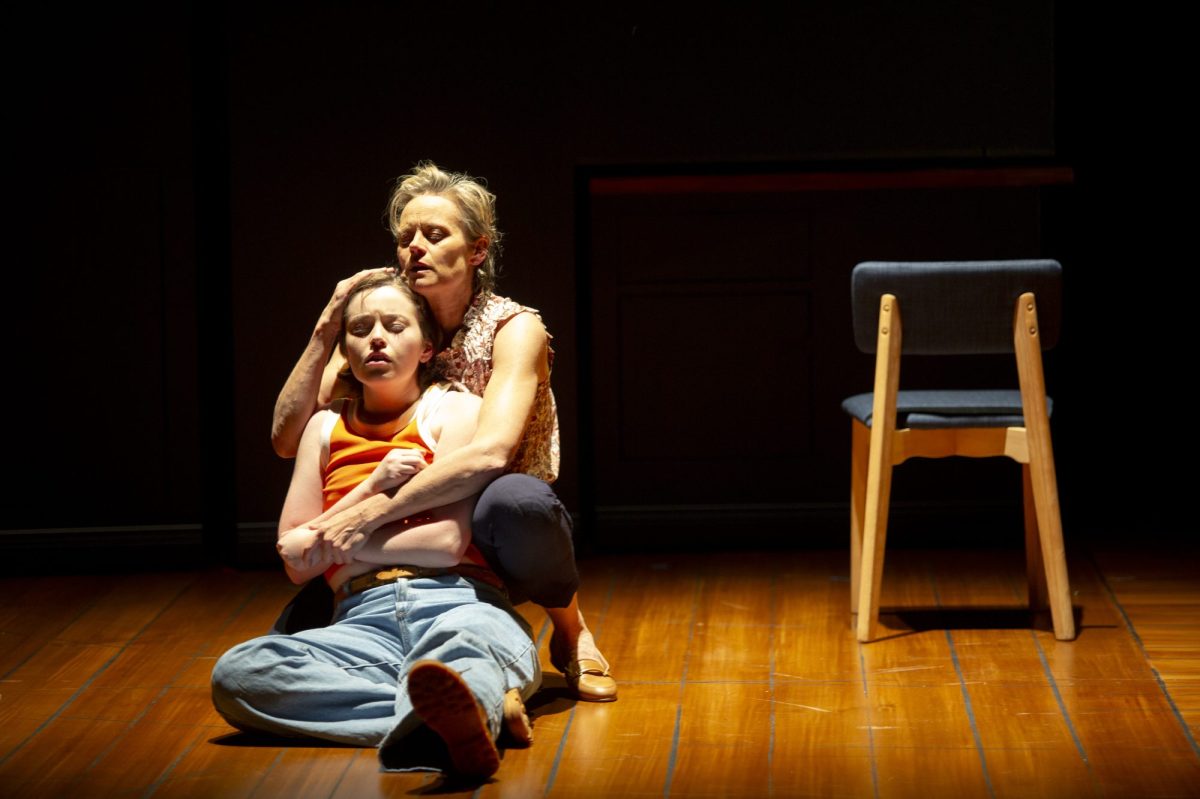Kendall Feaver’s debut play The Almighty Sometimes, a study in teenage mental health, first opened in the UK in 2018 and has since won multiple awards. It’s not hard to see why in this latest realisation of the script, a Melbourne Theatre Company (MTC) production that cogently teases out and does justice to the nuances of Feaver’s words.
Nadine Garner plays schoolteacher Renee, with an 18-year-old daughter, Anna (Max McKenna). When she was seven, Anna, precociously and prolifically wrote short stories that focused on death and abandonment. In hindsight it was not so surprising; her father had recently died. But she also tried to throw herself out of a window – a broken limb a legacy of her botched attempt.
Her understandably worried mother took Anna to a psychiatrist, Vivienne (Louisa Mignone), who prescribed a medley of pills, designed to counter the child’s highly sensitive, volcanic tantrums and control her mood swings. The medication worked, but also concurrently managed to dull her imaginative spirit. The condition Anna has is unnamed; it feels as though Feaver is deliberately avoiding the strictures of a defining label.
Now, as an adult, and trying to find the impetus to be a writer, Anna no longer wishes to be medicated. ‘I’ve been on those pills for so long, I don’t know who I am without them,’ she argues, wanting to be left alone to be her authentic self. Renee, in full protective maternal mode, is against Anna’s desperate bid for autonomy sans a cocktail of drugs designed as a means for mediation or arguably – interference– with the wiring of her brain.
But Anna’s at the giddy cusp of her adult life: thinking of maybe applying for uni in a different state, or even country, and navigating a new relationship with Oliver (Karl Richmond). She wants to explore the dimensions of her own identity, and rediscover her talent for writing, a childhood creative passion that she believes has been compromised by the heavy dosage.
Neurologically, Anna is trying to wrest back control, but at what cost to her own wellbeing and her relationship with her mother and her boyfriend?
The minimalist set, with its central grey moveable and revolving wall panels is effective without being overpowering. At times, Jacob Battista’s design allows the structure to become an obstruction, an escape or a maze – a physical mapping of Anna’s fluctuating mental state. Amelia Lever-Davidson’s lighting too evokes an atmospheric mood, of gradations and shade.
This is a play that allows all four actors to shine, with the full weight of Feaver’s words and Hannah Goodwin’s uncomplicated direction behind them.
Garner and McKenna, in particular, put in bravura performances in their push-pull dynamic, one that strains between the desire for freedom and the need for safety. It’s a familiar story, that of an adolescent-adult grasping for independence and contesting the fear of a parent unable to let their child go, but Feaver’s decision to explore the stigma of teenage mental pathology brings a sharp focus to this particular rite of passage.
Garner, with four decades’ acting experience behind her, is naturally a formidable force on stage as a single mother who loves fiercely, yet is conflicted by her motivations and actions towards her suffering daughter, but McKenna is a revelation who moves animalistically between feisty and wounded, confused and strident. Anna’s manic rages, her sullen withdrawals – indeed her constant instability and full-hearted complexity – all are exceptionally captured. In the role, McKenna is very much a worthy combatant to Garner’s anxious solicitations. Both are equally tormented souls.
As the health professional trying to help, Mignone perfectly imbues the effort of maintaining professional distance while occasionally overstepping her boundaries, while Richmond’s gawky and sweet representation of a teenage boy trying to deal with an unstable new love interest is sure-footed and believable. He says to Anna at one point, ‘So what kind of crazy are you? Girl Interrupted or Fatal Attraction?’, garnering much needed nervous laughter.
The play canvasses many questions, but wisely does not answer them in any definitive manner, and the audience’s sympathies sway from one side to the other. Are the risks of (over)medication acceptable if they allow “normal” life? What about the possibilities of misdiagnosis? Does the child and teenage brain change with prolonged drug taking? Where do blurring edges between control and care lie? And what are the ethics of the medical health profession in terms of exploiting real life patients in case studies? The fact that the play is prepared to sit in moral ambiguity makes it all the more powerful.
The Almighty Sometimes is at once tough and tender as it explores the bumpy terrain of what it means to live with a mental illness – from the jagged perspectives of the afflicted, but also their loved ones. The cast draw deeply from Feaver’s emotional well, with the script and direction a propulsive force that moves along a multilayered story from beginning to end.
Read: Theatre review: The President, Roslyn Packer Theatre
This play has been performed in Australia before, by Queensland Theatre and by Sydney’s Griffin Theatre, so MTC’s iteration is not a premiere. Nonetheless, the investment in staging it again is redoubtable evidence of its currency in terms of continuing the conversation about the fraught state of mental health care in this country.
The Almighty Sometimes by Kendall Feaver
Director: Hannah Goodwin
MTC, Southbank Theatre
Assistant Director: Jennifer Sarah Dean
Set and Costume Designer: Jacob Battista
Lighting Designer: Amelia Lever-Davidson
Composer and Sound Designer: Kelly Ryall
Voice and Text Coach: Matt Furlani
Fight Choreographer and Movement Consultant: Lyndall Grant
Intimacy Coordinator: Bayley Turner
Cast: Nadine Garner, Max McKenna, Louisa Mignone, Karl Richmond
The Almighty Sometimes will be performed until 18 May 2024.





